人教版六年级英语上册期中测试卷
人教版六年级上册英语期中试卷【含答案】
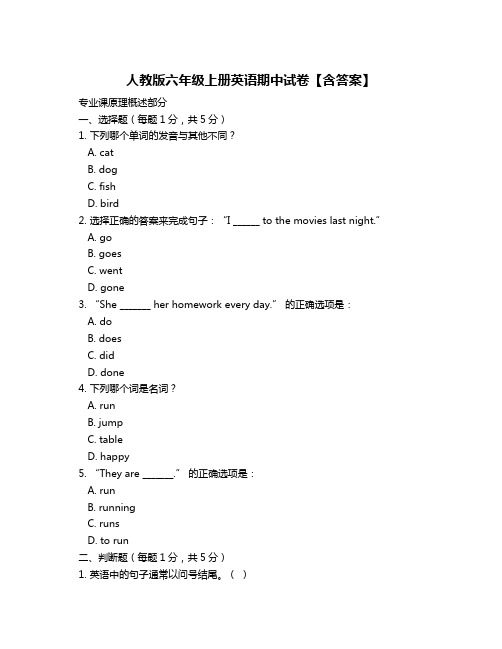
人教版六年级上册英语期中试卷【含答案】专业课原理概述部分一、选择题(每题1分,共5分)1. 下列哪个单词的发音与其他不同?A. catB. dogC. fishD. bird2. 选择正确的答案来完成句子:“I ______ to the movies last night.”A. goB. goesC. wentD. gone3. “She _______ her homework every day.” 的正确选项是:A. doB. doesC. didD. done4. 下列哪个词是名词?A. runB. jumpC. tableD. happy5. “They are _______.” 的正确选项是:A. runB. runningC. runsD. to run二、判断题(每题1分,共5分)1. 英语中的句子通常以问号结尾。
()2. “I like apples” 和“I like apple” 的意思是相同的。
()3. “He doesn't have a pen” 意味着他有一支钢笔。
()4. “Can” 用于提问能力。
()5. 英语中的形容词总是放在名词之前。
()三、填空题(每题1分,共5分)1. I _______ (be) a student.2. He _______ (have) a book.3. She _______ (like) to read.4. We _______ (go) to school every day.5. They _______ (watch) TV last night.四、简答题(每题2分,共10分)1. 写出五种不同的颜色。
2. 翻译:“我喜欢吃水果。
”3. 写出三个一般现在时的动词形式。
4. 举例说明一般过去时。
5. 解释什么是名词?五、应用题(每题2分,共10分)1. 用适当的形式填空:“She _______ (like) _______ (play) football.2. 完成对话:A: What _______ (do) you do last weekend?B: I _______ (go) to the park.3. 翻译:“他昨天去了图书馆。
人教版六年级上册英语期中测试卷
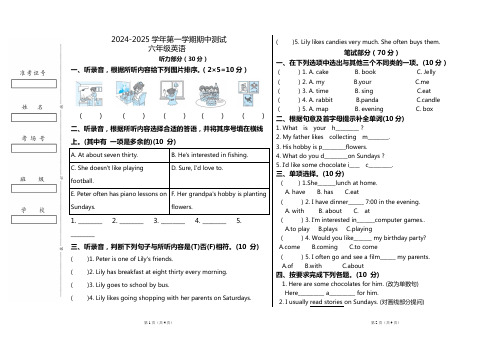
2024-2025学年第一学期期中测试六年级英语听力部分(30分)一、听录音,根据所听内容给下列图片排序。
(2×5=10分)()()()()()二、听录音,根据所听内容选择合适的答语,并将其序号填在横线上。
(其中有一项是多余的)(10 分)A. At about seven thirty.B. He's interested in fishing.C. She doesn't like playingfootball.D. Sure, I'd love to.E. Peter often has piano lessons on Sundays.F. Her grandpa's hobby is planting flowers.1. ________2. ________3. ________4. ________5.________三、听录音,判断下列句子与所听内容是(T)否(F)相符。
(10 分) ( )1. Peter is one of Lily's friends.( )2. Lily has breakfast at eight thirty every morning.( )3. Lily goes to school by bus.( )4. Lily likes going shopping with her parents on Saturdays. ( )5. Lily likes candies very much. She often buys them.笔试部分(70分)一、在下列选项中选出与其他三个不同类的一项。
(10分)()1. A. cake B. book C. Jelly ()2. A. my B.your C.me()3. A. time B. sing C.eat ()4. A. rabbit B.panda C.candle ()5. A. map B. evening C. box二、根据句意及首字母提示补全单词(10分)1. What is your h_________ ?2. My father likes collecting m________.3. His hobby is p_________flowers.4. What do you d_________on Sundays ?5. I’d like some chocolate i____ c_________.三、单项选择。
人教六年级上册英语期中测试卷(含答案)

人教六年级上册英语期中测试卷(含答案) I。
省略II。
英汉互译。
1.坐火车 - take a train2.今天晚上 - ___3.直走 - go straight4.慢下来 - slow down5.bookstore - 书店ic book - 漫画书7.poster - 海报8.take a trip - 去旅行III。
单项选择。
1.Where are you going next week。
- C2.How do you go to the USA。
- A3.Where are you going tomorrow。
- A4.___ right at the hospital。
please。
- A5.Slow down and。
at a yellow light。
- B6.They are going to go for a ic。
- AIV。
选词填空。
1.Where are you going this afternoon。
- hospital2.What are you going to buy。
- postcard3.How can I get there。
- bus4.Can I help you。
- word books5.When are you going。
- Next week.V。
连词成句。
1.I usually go to school on foot.2.I'm going to go and have a ic.country。
so I always watch them carefully。
When the light is green。
I can go。
When it's red。
I must。
It's very important to follow the rules。
Last week。
I saw a boy who didn't follow the rules。
人教版(PEP)小学六年级英语上册期中测试卷(含答案)

小学六年级英语上册期中测试卷【含答案】(满分:100分时间:60分钟)一、按要求写词语。
(10分)1、have (第三人称单数形式) _______ 2.take (过去式) _______ 3.come (现在分词) _______ 4.can’t (完全形式) _______ 5.know (同音词) _______二、选出下列每组单词中不同类的一项,画__线。
(10分)1、A.father B.mother C.apple 2.A.basketball B.worker C.football 3.A.library B.chocolate C.mooncake 4.A.tiger B.wood C.lion 5.A.Earth B.China C.Canada三、选择填空。
(20分)1、—______ are you going?()—Next week.A.What B.When C.How2、_________an interesting story! ()A.What B.How C.How a D.When3、My mother never _______ basketball because she can't play it.()A.plays the B.play C.plays4、We can’t see ____ sun at night. ()A.a B.an C.the D.no5、What Linda do yesterday?()A.is B.does C.did6、—______ the teachers' office? ()—It's on the second floor.A.Where B.Where's C.What's7、There are five _______ on the table. ()A.tomatos B.pinaoes C.radioes D.photos 8、—________ older, Mary or Ann? ()—Mary.A.Whose is B.Who is C.Who are9、February is the __________ month of a year.()A.second B.two C.three10、They are my _______. ()A.friend B.a friend C.friends四、句型转换,按要求完成下列句子。
小学人教版六年级英语上册期中测试卷与答案
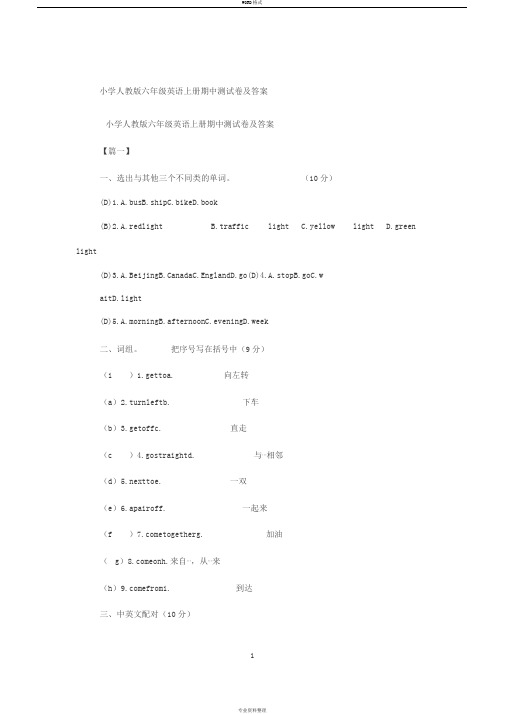
小学人教版六年级英语上册期中测试卷及答案小学人教版六年级英语上册期中测试卷及答案【篇一】一、选出与其他三个不同类的单词。
(10分)(D)1.A.busB.shipC.bikeD.book(B)2.A.redlight B.traffic light C.yellow light D.green light(D)3.A.BeijingB.CanadaC.EnglandD.go(D)4.A.stopB.goC.waitD.light(D)5.A.morningB.afternoonC.eveningD.week二、词组。
把序号写在括号中(9分)(i )1.gettoa. 向左转(a)2.turnleftb. 下车(b)3.getoffc. 直走(c )4.gostraightd. 与⋯相邻(d)5.nexttoe. 一双(e)6.apairoff. 一起来(f )etogetherg. 加油(g)eonh.来自⋯,从⋯来(h)efromi. 到达三、中英文配对(10分)(E)1.Howdoyougotoschool?A. 祝你生日快乐!(C)2.Stopataredlight.B. 我怎么才能到博物馆?(D)3.Excuseme.Whereisthelibrary?C. 红灯停。
(B)4.HowcanIgettothemuseum?D. 对不起请问,图书馆在哪?(A)5.Happybirthdaytoyou!E. 你怎么上学去的?四、根据汉语完成句子(10分)1.我经常骑自行车去上学。
Ioftengotoschoolbybike..2.我爸爸妈妈周末要去看望爷爷奶奶。
Myfatheranmotheraregoingtovisitmygrandparentsattheweekend.3.—今天下午你要去哪里?—whereareyougoingthisaftenoon?—我要去书店。
—I’mgoingtothebookstore.4.我要去买一本漫画书。
人教版(PEP)六年级上册英语期中考试试卷(含答案)
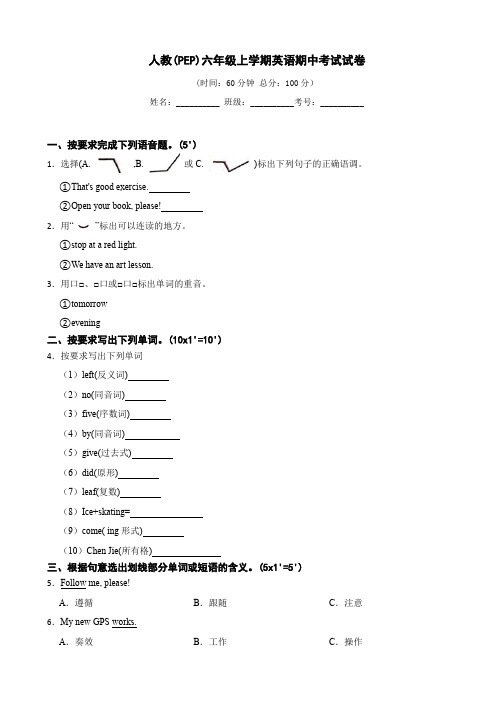
人教(PEP)六年级上学期英语期中考试试卷(时间:60分钟总分:100分)姓名:__________ 班级:__________考号:__________一、按要求完成下列语音题。
(5')1.选择(A. ,B. 或C. )标出下列句子的正确语调。
①That's good exercise.②Open your book, please!2.用“ ”标出可以连读的地方。
①stop at a red light.②We have an art lesson.3.用口□、□口或□口□标出单词的重音。
①tomorrow②evening二、按要求写出下列单词。
(10x1'=10')4.按要求写出下列单词(1)left(反义词)(2)no(同音词)(3)five(序数词)(4)by(同音词)(5)give(过去式)(6)did(原形)(7)leaf(复数)(8)Ice+skating=(9)come( ing形式)(10)Chen Jie(所有格)三、根据句意选出划线部分单词或短语的含义。
(5x1'=5')5.Follow me, please!A.遵循B.跟随C.注意6.My new GPS works.A.奏效B.工作C.操作7.A helmet, In the USA people on bikes must wear one.A.一个B.头盔C.—8.Robin and I are going to read a peom.A.唱一首歌B.写一首诗C.读一首诗9.Papa's going to buy you a looking glass.A.一个镜子B.一个好看的玻璃杯C.一副眼镜四、选择合适的答案。
(5x1'=5')10.What an _____ film!A.beautiful B.wonderful C.interesting11.I see a ____ bird.A.talking B.talk C.talks12.How can I get to ____?A.Fuxing Hospital B.the Fuxing Hospital C.the fuxing, hospital 13.In 2009, they ____ to school by plane.A.go B.went C.will go14.My grandma will tell ____ a story.A.we B.our C.us五、看图,补全句子,每空一词,使句子意思完整。
人教版六年级英语上册期中考试测试卷附答案
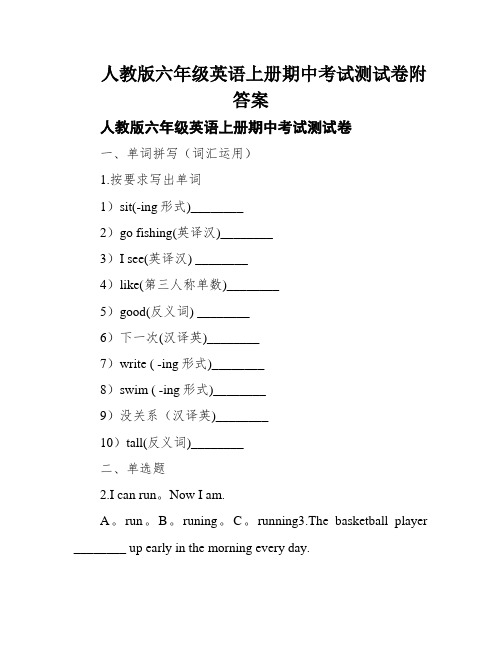
人教版六年级英语上册期中考试测试卷附答案人教版六年级英语上册期中考试测试卷一、单词拼写(词汇运用)1.按要求写出单词1)sit(-ing形式)________2)go fishing(英译汉)________3)I see(英译汉) ________4)like(第三人称单数)________5)good(反义词) ________6)下一次(汉译英)________7)write ( -ing形式)________8)swim ( -ing形式)________9)没关系(汉译英)________10)tall(反义词)________二、单选题2.I can run。
Now I am.A。
run。
B。
runing。
C。
running3.The basketball player ________ up early in the morning every day.A。
get。
B。
gets。
C。
got4.He was born ________ Guangzhou.A。
XXX________ afactory.A。
with。
B。
on。
C。
in6.—What toys have you got。
I ____ some toy dogs。
A。
has got。
B。
have got。
C。
there is7._____ class。
we went to West Lake.A。
Behind。
B。
After。
C。
At8.Don'tlate next time!A。
are。
B。
be。
C。
is9.She ____from XXX.A。
is。
B。
am。
C。
are10.We have four.XXX.—___________ twenty-eight and o?It's sixty.A。
What's。
B。
Who's。
C。
What3、按照所给情境,挑选符合的选项12.当红灯亮时,你会:A。
人教版六年级上册英语期中试卷【三套】

【导语】仔细审题,认真答题。
⼩编整理了⼈教版六年级上册英语期中试卷【三套】,希望对你有帮助!⼈教版六年级上册英语期中试卷1⼀、在A、B、C、D四个选项中,划线部分读⾳相同的画“ ☺”,不相同的画“ ☹” 。
(6×2’)()1.A.robot B.running C. lot D. lunch()2.A.read B.cheap C. clean D. dream()3.A.prize B.decide C. ninth D. night()4.A.where B.air C. were D. there()5.A.first B.second C. whose D. space()6.A.who B.why C.what D.white⼆、⽤所给词的适当形式填空。
(10×2’)1.We (go)to the store yesterday.2.Ken was (第⼆)in the running race.3.Tom’s mother (have)a nice jacket.4.Ann didn’t win a p ,she was sad.5.Astronauts went to space in a .6.John the room last night.7.I my friend yesterday.8.What Li Ming (do)last Saturday?st Saturday,I many apples.10.The m goes round(围绕)the Earth.三、单项选择。
(10×2’)()1.It Sunday yesterday.A. isB. wasC. were()2.Ken and Ann go to school yesterday.A. didn’tB. didC. weren’t()3.Yang Li Wei is China’s astronaut in space.A. oneB. firstC. second()4.— were Wang Mei and Li Ming last Sunday?—They were at the swimming pool.A、WhatB、WhoC、Where()5.Ken the room yesterday.He was sick.A、wasn't cleanB、didn't cleanC、didn't cleaned()6.We had a great time at the park .A、tomorrowB、on SundaysC、yesterday afternoon()7.—Did you clean the classroom this room?版#~*^ — .I was sick at home.A、Yes,I didB、No,I didn’tC、No,I wasn’t()8. Mocky to do the high jump.A、decidedB、wantC、went()9.We are afraid of Miss Li she is very friendly.A、 becauseB、butC、and()10.In the high jump,Mocky came .A、lastB、secondC、first四、从II栏中找出与I栏中相对应的答语。
新课标人教版小学英语六年级上册期中试卷含参考答案
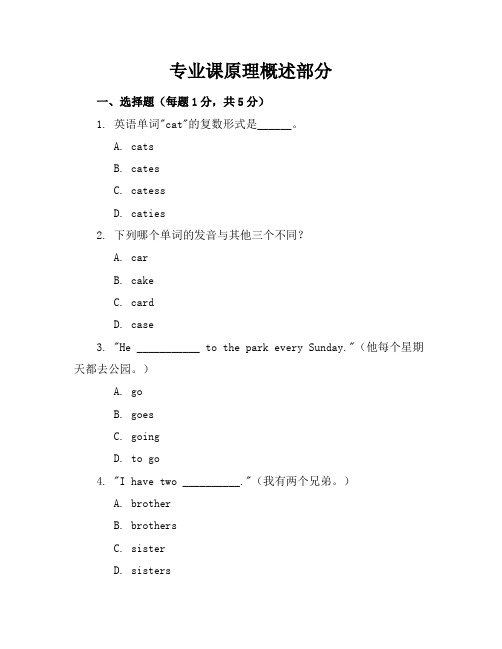
专业课原理概述部分一、选择题(每题1分,共5分)1. 英语单词"cat"的复数形式是______。
A. catsB. catesC. catessD. caties2. 下列哪个单词的发音与其他三个不同?A. carB. cakeC. cardD. case3. "He ___________ to the park every Sunday."(他每个星期天都去公园。
)A. goB. goesC. goingD. to go4. "I have two __________."(我有两个兄弟。
)A. brotherB. brothersC. sisterD. sisters5. "She ___________ a teacher."(她是一名老师。
)A. amB. isC. areD. be二、判断题(每题1分,共5分)1. "Apples"是"apple"的复数形式。
()2. "I like cats"意思是"我喜欢狗"。
()3. "He is reading a book"表示"他在读书"。
()4. "She has a pen"意思是"她有一支钢笔"。
()5. "They are students"表示"他们是老师"。
()三、填空题(每题1分,共5分)1. My mother is a ________. She works in a hospital.2. I have ________ apples. One is red and the other is green.3. ________ you like tea or coffee?4. They ________ to the movies last night.5. There are ________ days in a week.四、简答题(每题2分,共10分)1. 请写出"狗"的英文单词。
人教版六年级上册英语期中试卷及答案人教版

人教版六年级上册英语期中试卷及答案人教版Part 1 选择题1. — Do you like pizza?— ___________.A. Yes, I wouldB. No, I don'tC. Yes, I do2. — Excuse me, where is the nearest hospital?— Go ___________ for two blocks and turn right.A. straightB. leftC. right3. Lucy and Lily are twins. Lucy is tall and Lily is short. They___________ like each other.A. lookB. looksC. looking4. — ___________ is the cute kitten?— It's Jim's.A. WhatB. WhoseC. Where5. — Would you like some milk?— ___________.6. Tom doesn't eat ___________ for breakfast.A. an appleB. noodlesC. soup7. Sarah is a ___________ teacher. She teaches math.A. historyB. artC. math8. — Does Tim have a new bike?— Yes, he ___________ one yesterday.A. getB. getsC. got9. — What sports do you like?— I like ___________.A. pianoB. swimmingC. drawing10. — Where is the post office?— Go ___________ for three blocks and turn left.A. straightB. leftC. rightPart 2 完型填空1. A. take B. go C. arrive2. A. do B. take C. have3. A. get B. leave C. arrive4. A. classes B. exams C. teachers5. A. eat B. drink C. listen6. A. finish B. start C. have7. A. play B. do C. watch8. A. o'clock B. forty-five C. twentyPart 3 阅读理解AKate is a teacher. She teaches English in a middle school. She has a son. His name is Jim. He's six. Kate and Jim like animals. They have acat and a dog. The cat is white and black. The dog is brown. They have a bird, too. The bird is yellow.Jim likes playing with the dog. Kate likes playing with the cat. They feed the cat and the dog every day. Kate feeds the bird, too.1. What does Kate do?A. She's a student.B. She's a doctor.C. She's a teacher.2. How old is Jim?A. Five.B. Six.C. Seven.3. What color is the cat?A. Brown.B. White and black.C. Yellow.4. Who likes playing with the dog?A. Kate.B. Jim.C. Kate and Jim.5. Who feeds the bird?A. Jim.B. Kate.C. Kate and Jim.BMr. Smith has a daughter. Her name is Lily. She is seven. She likes animals. She has a rabbit. The rabbit is white and fluffy. Mr. Smith has acar. It's black. He drives (开车) to work every day. He likes his car. Lily likes going to the park. She likes playing with the rabbit.1. How old is Lily?A. Six.B. Seven.C. Eight.2. What does Lily have?A. A dog.B. A rabbit.C. A cat.3. What color is the rabbit?A. Black.B. White and black.C. White and fluffy.4. What does Mr. Smith do every day?A. He drives to work.B. He takes a bus to work.C. He walks to work.5. What does Lily like doing?A. Going to school.B. Playing with the rabbit.C. Watching TV.Part 4 写作请根据以下提示写一篇60词左右的短文:提示:你的名字叫Alice,请你介绍你的朋友Mike。
六年级上册期中考试英语试卷含答案(人教版,word版)

人教PEP版六年级上册期中测试英语试卷(含听力)一、选择题1.判断下列各组单词划线部分读音是否相同,相同的打∨,不同的请找出来,将字母编号写在括号里。
(1)A.mouth B.flower C.down D.know(2)A.hair B.bear C.wear D.pair(3)A.water B.watch C.what D.clock(4)A.heavy B.cat C.pet D.chess(5)A lunch B.music C.under D.cut2.If you go to Jiangxi by ferry. You must ______ a life jacket. ( )A. wearB. wearsC. wearing3.Why not _____ shopping with your mother? ( )A. goingB. is goingC. go4._____ you going to play football next Sunday? ( )A. DoB. CanC. Are5.Mandy_________about dancing sometimes. ( )A. talkB. talkingC. talks6.Amy is going to look _____ some nice leaves. ( )A. toB. afterC. for二、阅读理解读对话,回答问题。
Tomorrow is Saturday. We are going to have no classes. We are going to the Nature Park. The park is far. First, we’re going by bus. Then we’re going to walk to the park. Sarah is going to make a snowman. Mike is going to take pictures. Chen Jie is going to skate. I am going to climb mountains with Jack. Mary and Amy are going to draw pictures. We are going to have a good time.7.What day is it today?_______________________________________________8.Where do they want to go?___________________________________________9.How are they going to the Nature Park?_________________________________10.What is Jack going to do?___________________________________________11.Are they going to have a good time?___________________________________三、填空题12.用所给的词的适当形式填空。
人教版PEP六年级英语上册期中试卷(含答案)
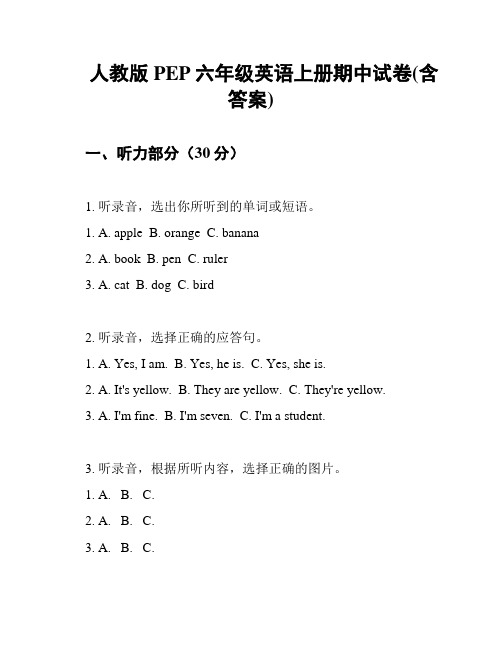
人教版PEP六年级英语上册期中试卷(含答案)一、听力部分(30分)1. 听录音,选出你所听到的单词或短语。
1. A. apple B. orange C. banana2. A. book B. pen C. ruler3. A. cat B. dog C. bird2. 听录音,选择正确的应答句。
1. A. Yes, I am. B. Yes, he is. C. Yes, she is.2. A. It's yellow. B. They are yellow. C. They're yellow.3. A. I'm fine. B. I'm seven. C. I'm a student.3. 听录音,根据所听内容,选择正确的图片。
1. A. B. C.2. A. B. C.3. A. B. C.4. 听录音,根据所听内容填写单词。
1. My father is a (doctor).2. I have two (sisters).3. My favorite (color) is blue.5. 听录音,根据对话内容选择正确的选项。
1. A. She is my mother. B. She is my sister. C. She is my friend.2. A. On the table. B. In the bag. C. Under the chair.3. A. Yes, I do. B. Yes, she does. C. Yes, he does.二、看图说词(10分)请根据图片内容,写出正确的单词。
1. Picture 1: ___________2. Picture 2: ___________3. Picture 3: ___________三、选择填空(20分)从A、B、C三个选项中选择一个正确的答案填空。
1. — ______ is your mother? — She is a teacher.A. HowB. WhatC. Where2. I have ______ books. They are very interesting.A. aB. anC. two3. — ______ are you? — I am fine, thank you.A. WhoB. WhatC. How4. ______ is your brother? He is eight years old.A. WhatB. WhereC. How old5. We ______ English, Chinese, and math at school.A. studyB. playC. eat四、连词成句(10分)将单词连成完整的句子。
人教版六年级上册英语期中试卷及答案
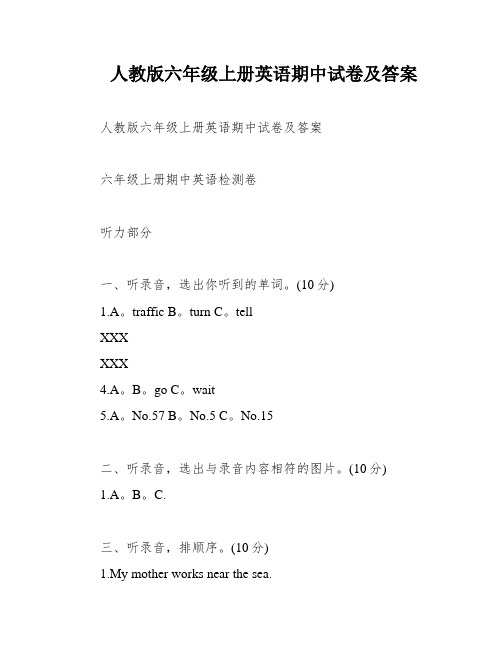
人教版六年级上册英语期中试卷及答案人教版六年级上册英语期中试卷及答案六年级上册期中英语检测卷听力部分一、听录音,选出你听到的单词。
(10分)1.A。
traffic B。
turn C。
tellXXXXXX4.A。
B。
go C。
wait5.A。
No.57 B。
No.5 C。
No.15二、听录音,选出与录音内容相符的图片。
(10分)1.A。
B。
C.三、听录音,排顺序。
(10分)1.My mother works near the sea.2.Mike goes to work by car.3.Peter is going to have an English class.4.XXX to work by bus.5.We are going to Beijing next Wednesday.四、听录音,把下列句子补充完整。
(10分)1.The park is behind the science museum.2.There is a zoo in my city.3.Let's go and turn left at the bookstore.4.I usually go to the XXX.5.—What are you going to do tonight?I'm going to see a movie.笔试部分五、找出下列每组单词中不属于同一类的一项。
(10分)1.A。
foot B。
train C。
plane D。
subway2.A。
museum B。
post office C。
ask D。
library3.A。
how B。
must C。
what D。
where4.A。
left B。
right C。
turn D。
frontXXX book六、单项选择。
(20分)1.—How can I go to Shanghai?You can go by plane。
(C)A。
人教版英语六年级上册期中测试卷(附答案)
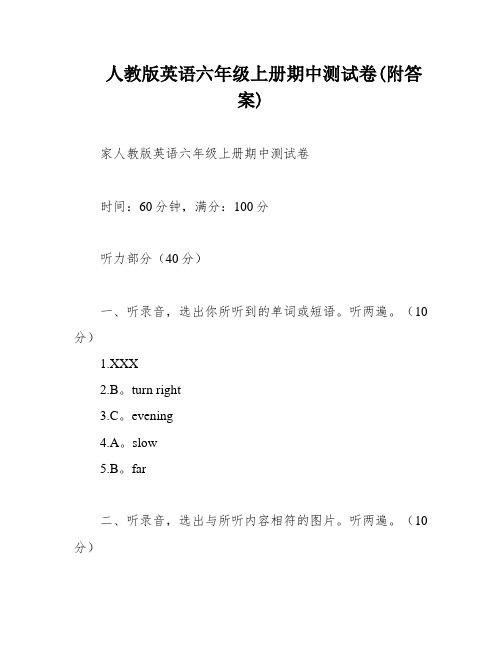
人教版英语六年级上册期中测试卷(附答案)家人教版英语六年级上册期中测试卷时间:60分钟,满分:100分听力部分(40分)一、听录音,选出你所听到的单词或短语。
听两遍。
(10分)1.XXX2.B。
turn right3.C。
evening4.A。
slow5.B。
far二、听录音,选出与所听内容相符的图片。
听两遍。
(10分)三、听录音,选择正确的答语。
听两遍。
(10分)1.B。
It’s not far from here.2.A。
It’s next to the library.3.B。
I’m going to Hainan this Sunday.4.A。
She is going to visit the museum.5.C。
I can take the No。
108 bus to get there.四、听录音,判断下列句子正(T)误(F)。
听两遍。
(10分)1.T2.T3.T4.F本试卷为人教版英语六年级上册期中测试卷,考试时间为60分钟,总分为100分。
听力部分(40分)一、听录音,选出你所听到的单词或短语。
听两遍。
(10分)1.XXX2.B。
turn right3.C。
evening4.A。
slow5.B。
far二、听录音,选择与所听内容相符的图片。
听两遍。
(10分)三、听录音,选择正确的答语。
听两遍。
(10分)1.B。
It’s not far from here.2.A。
It’s next to the library.3.B。
I’m going to Hainan this Sunday.4.A。
She is going to visit the museum.5.C。
I can take the No。
108 bus to get there.四、听录音,判断下列句子正(T)误(F)。
听两遍。
(10分)1.T2.T3.T4.FB。
No。
there isn't.6.My grandma will tell us a story about Chang'e.7.Why not go on Tuesday?8.XXX.9.Where are they going there。
人教版六年级上册期中考试英语试卷含答案
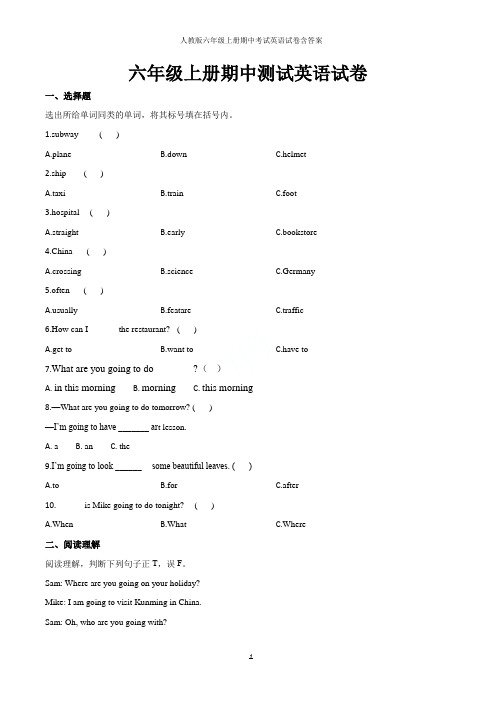
六年级上册期中测试英语试卷一、选择题选出所给单词同类的单词,将其标号填在括号内。
1.subway ( )A.planeB.downC.helmet2.ship( )A.taxiB.trainC.foot3.hospital ( )A.straightB.earlyC.bookstore4.China ( )A.crossingB.scienceC.Germany5.often ( )uallyB.featareC.traffic6.How can I ______ the restaurant? ( )A.get toB.want toC.have to7.What are you going to do________?()A. in this morningB. morningC. this morning8.—What are you going to do tomorrow? ( )—I’m going to have _______ ar t lesson.A. aB. anC. the9.I’m going to look ______ some beautiful leaves. ( )A.toB.forC.after10.______ is Mike going to do tonight? ( )A.WhenB.WhatC.Where二、阅读理解阅读理解,判断下列句子正T,误F。
Sam: Where are you going on your holiday?Mike: I am going to visit Kunming in China.Sam: Oh, who are you going with?Mike: I’m going with my mum, my dad and my sister Kate.Sam: What are you going to do there?Mike: I’m going to see folk dances. I’m going to visit Stone Forest, too. Sam: That’s great! How is your family going to get there?Mike: We are going by plane.Sam: When are you going?Mike: We’re going this weekend.Sam: Have a good time!11.Mike is going to visit Kunming. (______)12.Mike isn’t going to visit Stone Forest. (______)13.They are going there by bus. (______)14.They are going this weekend. (______)15.Sam and Mike are going to see folk dances. (______)三、连词成句连词成句。
2024-2025学年人教PEP版英语六年级上册期中试题2(含答案)
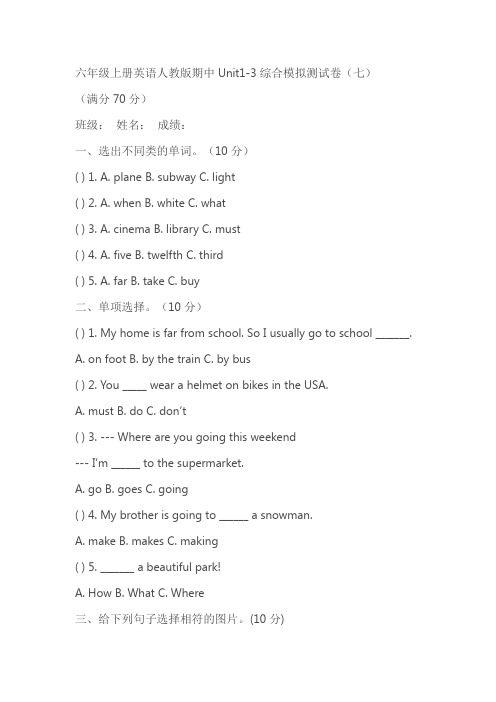
六年级上册英语人教版期中Unit1-3综合模拟测试卷(七)(满分70分)班级:姓名:成绩:一、选出不同类的单词。
(10分)( ) 1. A. plane B. subway C. light( ) 2. A. when B. white C. what( ) 3. A. cinema B. library C. must( ) 4. A. five B. twelfth C. third( ) 5. A. far B. take C. buy二、单项选择。
(10分)( ) 1. My home is far from school. So I usually go to school _______.A. on footB. by the trainC. by bus( ) 2. You _____ wear a helmet on bikes in the USA.A. mustB. doC. don’t( ) 3. --- Where are you going this weekend--- I’m ______ to the supermarket.A. goB. goesC. going( ) 4. My brother is going to ______ a snowman.A. makeB. makesC. making( ) 5. _______ a beautiful park!A. HowB. WhatC. Where三、给下列句子选择相符的图片。
(10分)( ) 1. Turn left at the first crossing.( ) 2. I want to go to the bookstore.( ) 3. The hospital is behind the cinema.( ) 4. Go straight. Then you can see it.( ) 5. The restaurant is next to the museum.四、连词成句。
人教版六年级英语上册期中考试测试卷附答案
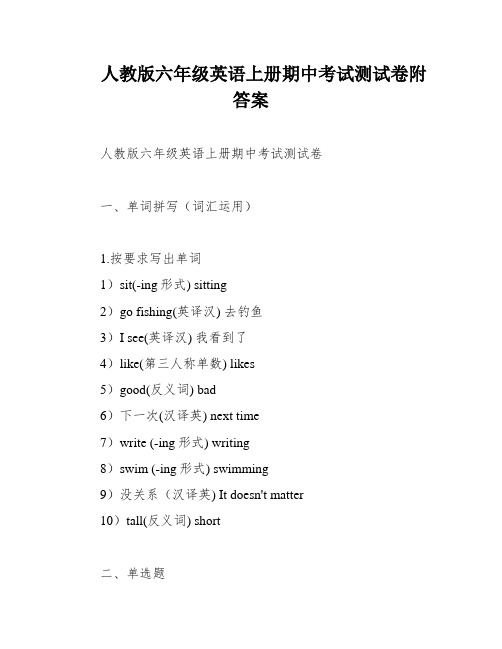
人教版六年级英语上册期中考试测试卷附答案人教版六年级英语上册期中考试测试卷一、单词拼写(词汇运用)1.按要求写出单词1)sit(-ing形式) sitting2)go fishing(英译汉) 去钓鱼3)I see(英译汉) 我看到了4)like(第三人称单数) likes5)good(反义词) bad6)下一次(汉译英) next time7)write (-ing形式) writing8)swim (-ing形式) swimming9)没关系(汉译英) It doesn't matter10)tall(反义词) short二、单选题2.I can run。
Now I am running.A。
run。
B。
runing。
C。
running3.The basketball player gets up early in the morning every day.A。
get。
B。
gets。
C。
got4.He was born in XXX.A。
XXX5.My sister is a worker in a factory.A。
with。
B。
on。
C。
in6.—What toys have you got?I have got some toy dogs.A。
has got。
B。
have got。
C。
there is7.In class。
we went to West Lake.1.Behind2.After3.Don't be late next time!4.She is from XXX.5.Chairs6.It's sixty.7.What8.Wait.9.XXX?10.Thank you.11.I would like to have a water。
please.Rewritten:1.The word "Behind" is not a XXX。
- 1、下载文档前请自行甄别文档内容的完整性,平台不提供额外的编辑、内容补充、找答案等附加服务。
- 2、"仅部分预览"的文档,不可在线预览部分如存在完整性等问题,可反馈申请退款(可完整预览的文档不适用该条件!)。
- 3、如文档侵犯您的权益,请联系客服反馈,我们会尽快为您处理(人工客服工作时间:9:00-18:30)。
1. --- do you go to school?--- I go to school bus.A. How; byB. How; takeC. What; byD. What; take2. Great changes in our hometown in the last ten years.A. have happenedB. have been taken placeC. have been happenedD. have taken place3. --- Do you know the meaning of these new words?--- Sorry, I don't. Let's in the dictionary.A. look after themB. look up themC. look them afterD. look them up4. It's too . I don't think you can get to school on time, you take ataxi.A. late; unlessB. late; ifC. early; unlessD. early; if5. The thief often things from this factory.A. stealsB. treatsC. punishesD. spreads6. Many kids enjoy chocolate. But it's bad for their teeth.A. eatB. to eatC. eatingD. to eating7. The Dragon Boat Festival is a festival China.A. tradition; ofB. traditional; ofC. tradition; atD. traditional; at8. I Linda will get good grades because she has worked hard for a long time.A. ask thatB. ask ifC. believe thatD. believe whether9. Li Ming is in poor health. He should pay more attention exercise.A. to takeB. to takingC. for takingD. in taking10. Can you tell me to the post office?A. where getB. where to getC. how getD. how to get11. Please tell me to improve my English.A. what I can doB. what can I doC. how I can doD. how can I do.12. Mr. Wang used to dinner in the restaurant, but now he is usedto every meal with his family at home.A. have; eatB. have; eatingC. having; eatD. having; eating13. Mary is very shy. She goes out and she has few friends.A. oftenB. alwaysC. seldomD. usually14. —How do you usually go to school?—I take a bus, but I walking now.A. was used to; am used toB. am used to; used toC. used to; am used toD. used to; use to15. —Could you tell me _____________________________?—Sure. It’s near the bank on the other side of the street.A. how to the post officeB. where is the post officeC. where the post office isD. when the post office was builtMore than 3,000 languages are spoken in the world. Of all these languages, English is the most widely used. When English is used, it has also 16 many new words from other languages. For example, Americans borrowed “cookbook” from German(德语). They 17 borrowed “tofu” and “kowtow” from Chinese.As we all know, there are 18 between western culture and Chinese culture. We can learn about those words by comparing how certain words are used. 19 , “you are a lucky dog” means you are a lucky person. To describe a person who is 20 , they say, “sick as a dog”. On the other hand, Chinese people love cats very much. But in western culture, “cat” is sometimes used to describe a woman that is 21 . The rose is considered as a symbol of love in both China and some western countries. People think the rose stands for love and 22 .China, a country with the largest population in the world, has 23 more people to learn English. By the 1990s, English learning has been very 24 with Chinese people. Many of them have done quite well in English.Now students are required to learn English and people think the study of English is a very important industry in China 25 in the rest of the world. The English language has played an important part in our lives.16. A. taken back B. taken out C. taken off D. taken in17. A. even B. also C. perhaps D. probably18. A. advantages B. records C. effects D. differences19. A. In fact B. In some ways C. For example D. As a result20. A. ill B. lazy C. afraid D. selfish21. A. kind-hearted B. pretty C. cruel D. helpful22. A. sadness B. attractionC. disappointmentD. friendship23. A. ordered B. encouraged C. told D. taught24. A. interested B. tired C. popular D. enjoyed25. A. as far as B. as well as C. as much as D. as long as三、阅读理解(共5小题;共10分)Here are some tips on listening. We hope it can help you in one way or other.● Relax yourself.Before you start to listen to something", you need to relax. Don't get nervous or excited. This will help you with your listening.● Listen carefully to the firs t sentence.The first sentence tells a lot about the whole passage. For example, if at the very beginning, you hear "Many shops in many parts of China have decided to talk a-way all kinds of Japanese goods off their shelves but some people say it's not a good idea. Our reporter says..." you know you will hear a piece of news, not a children's story, or a science report.● Think when you're listening.When you're listening, try to do some thinking. For example, you can think of the following questions: What happened When, where and how? What was the result and what does the speaker want to tell us? This way, you may understand the passage better.● Listen for important facts.It's important for you to remember some important facts. For example, if the passage is a science report, you should try to remember its findings and how the scientists got their results.● Don't think about one or two words for too long.You may hear some words that you don't know, but don't spend too much time on them. Very often, you'll find out what they mean later when you go on with the listening. But you can remember some words or sentences that you think are important, and you can use them when you're answering the questions.26. This whole passage is mainly about .A. tips on thinkingB. tips on finding the factsC. tips on listeningD. tips on remembering words27. It's better for you to keep when you begin to have a listening exam.A. excitedB. relaxedC. nervousD. worried28. The sentence "Many shops in many parts of China have decided to take away all kinds of Japanese goods off their shelves..." seem to be .A. the first sentence of a piece of newsB. a tip on readingC. the end of a piece of newsD. a tip on speaking29. When you're listening, it's important for you to remember .A. every wordB. every sentenceC. some important factsD. the whole passage30. Who is the passage the most helpful to?A. Foreign language learnersB. DoctorsC. ScientistsD. JournalistIn the 13th century, the famous Italian traveler, Marco Polo, traveled a long way to China. During his stay in China, he saw many wonderful things. One of the things he discovered was that Chinese used paper money. In western countries, people did not use paper money until the 15th century. However, people in China began to use paper money in the 7th century.A Chinese man called Cai Lun invented paper almost 2,000 years ago. He made it from wood. He took the wood from trees and made it into paper. He then put these pieces of paper together and made them a book.Now paper still comes from trees. We use a lot of paper every day. If we keep on wasting so much paper, there will not be any trees left on the earth. If there are no trees, there will be no paper. Every day, people throw away about 2,800 tons of paper in our city. It takes 17 trees to make one ton of paper. We mus t start using less paper now. If we don’t, we will not have enough time to grow more trees to take the place of those we use for paper. So how can we save paper? We can use both sides of every piece of paper, especially when we are making notes. We can choose drinks in bottles instead of those in paper packets. We can also use cotton handkerchiefs(手帕)and not paper ones. When we go shopping, we can use fewer bags. If the shop assistant does give us a paper bag, we can save it and reuse (再用) it later.31. What did Marco Polo do when he was in China?A. He discovered Cai Lun invented paper.B. He learned to make paper.C. He saw many wonderful things.D. He read a lot of books.32. When did people in western countries first use paper money?A. In the 17th century.B. In the 15th century.C. In the 13th century.D. In the 7th century.33. Which of the following is NOT the way of saving paper?A. To use both sides of every piece of paper.B. To use the paper bags from shops more than once.C. To use cotton handkerchiefs instead of paper ones.D. To plant more trees.四、单词拼写(单句首字母填空)(共5小题;共5分)34. If you want to look after the children well, you should be p . The children today are very naughty(淘气的).35. --- What do you often do during the Spring Festival?--- I often visit my r and friends.36. --- Hi, Wang Mei. Here's your letter. The s on it is very great. Can you give it to me? You know I have collected them for two years.--- Of course. Here you are.37. --- Is everyone here?--- Yes, Mr. Green. No one is a .38. --- You can a the accident if you drive your car slowly, Jim.--- Yes, you're right. I'm very sorry about it, sir.五、适当形式填空(单句适当形式)(共5小题;共5分)39. Tom told them (polite) to leave him in peace.40. --- Do you know Liu Shenglan?--- Yes, I do. He is very kind and (help).41. Don't shout at your mother. Your parents should be spoken to (polite).42. Although the man was a (strange), I tried my best to help him.43. --- Some people think that it's not useful to learn much (know). What about you?--- I don't think so. We should try our best to learn all the subjects well.七、书面表达(共1小题,满分15分)世界上有许多发明使得我们的生活越来越有趣,电脑就是其中之一。
